- Home
- Naguib Mahfouz
Three Novels of Ancient Egypt Page 2
Three Novels of Ancient Egypt Read online
Page 2
The ironic dynamism of the story is that it is to be how the ‘cause’ of young Pharaoh's desire to build palaces and acquire a woman whose extravagance matches his — political power and erotic power clasped together — contests the place of ‘more deserving'.
Yes it's Milan Kundera's maxim — the novelist is asking questions, not supplying answers — that makes this novel as challenging and entertaining as the conversation in Rhadopis's salon. House of fame, house of shame? As she becomes Pharaoh's mistress and obsession, is she the cause of his downfall, his people turning against him, their worshipped representative of the gods, because of his squandering of the nation's wealth on a courtesan? Or is Pharaoh a figure of the fatality of inherent human weakness? Is it not in our stars — fall from the sky of a gold sandal — but in ourselves, the Pharaoh himself, to fulfil personal desires? And further: isn't it the terrible danger in power itself that it may be used for ultimate distorted purpose. Dictators, tyrants. Mahfouz sets one's mind off beyond the instance of his story.
Rhadopis herself. Beginning with the introduction as prototype Barbie Doll as well as femme fatale the young Mahfouz achieves an evocation of the inner contradictions of the life she lives that no other writer whose work I know has matched. Zola's Nana must retire before her. On the evening at the end of the Nile festival, Rhadopis's admirer-clients knock on her door as usual. After dancing suggestively at the men's request, ‘dalliance and sarcasm came over her again'. To Hof, eminent philosopher among them: ‘You have seen nothing of the things I have seen.’ Pointing to the drunken throng, ‘… the cream of Egypt… prostrating themselves at my feet… It is as if I am among wolves.’ All this regarded amid laughter, as her titillating audacity. No one among these distinguished men seems to feel shame at this degradation of a woman; no one sees it as a consequence of the poverty she was born into, and from which it was perhaps her only escape. The class-based denial of the existence of any critical intelligence in menial women, including prostitutes, is always an injustice refuted convincingly by Mahfouz's women. This night she uses the only weapon they respect, capriciously withholds herself. ‘Tonight I shall belong to no man.'
A theatrical ‘storm of defiance’ is brewing in her as she lies sleepless. It may read like the cliche passing repentance of one who lives by the sale of her body. But the salutary mood is followed next night by her order that her door should be kept closed to everyone.
That is the night Pharaoh comes to her. No door may be closed to him. He is described as sensually as Mahfouz's female characters. The encounter is one of erotic beauty and meaning without necessity of scenes of sexual gyration. It is also the beginning of Pharaoh's neglect of state affairs for the power of a ‘love affair that was costing Egypt a fortune'. The price: prime minister Khnumhotep has had to carry out Pharaoh's decree to sequester temple estates. Pharaoh's choice is for tragedy, if we accept that the fall of the mighty is tragedy's definition, as against the clumsy disasters of ordinary, fallible people. Rhadopis, in conflict between passion for a man who is also a king and the epiphany of concern for the Egyptian people of whom she is one, uses her acute mind to devise means by which Pharoah may falsely claim that there is a revolt of the Maasayu tribes in the region of the priests’ lands and summon his army there to overcome the real rebellion, that of the priests. The intricate subterfuge involves exploiting an innocent boy — also in love with her — when Rhadopis resorts to her old powers of seduction to use him as messenger.
Tragedy is by definition inexorable as defeated Pharaoh speaks after the priests have exposed his actions to his people and the mob is about to storm the walls of his palace. ‘Madness will remain as long as there are people alive… I have made for myself a name that no Pharaoh before me ever was called: The Frivolous King.’ An arrow from the mob pierces his breast. ‘Rhadopis,’ he orders his men, ‘Take me to her… I want… to expire on Biga.’ We hardly have been aware of the existence of Pharaoh's unloved wife, the queen; how impressively she emerges now with a quiet command, ‘Garry out my lord's desire.’ Mahfouz's nascent brilliance as, above all political, moral, philosophical purpose, a story-teller, is revealed in the emotional pace of events by which this story meets its moving, questioning end, with the irony that Rhadopis's last demand on a man is to have the adoring boy messenger find a phial of poison with which she will join Pharaoh in death, final consummation of sexual passion. For the last, unrequited lover, asked how he obtained the phial, Mahfouz plumbs the boy's horror in the answer: “I brought it to her myself What was the young writer, Mahfouz, saying about love?
* * *
The Nile is the flowing harbinger of Egypt's destiny in the scope of Mahfouz's re-imagined pharaonic history, starting with Khufu's Wisdom, Fourth Dynasty, continuing with Rhadophis of Nubia, Sixth Dynasty, and concluding with Thebes at War, Seventeenth-Eighteenth Dynasty.
A ship from the North arrives up the Nile, at Thebes. On board not a courtesan or a princess but the chamberlain of Apophis, Pharaoh by conquest of both the North and South kingdoms. Again, through the indirection of an individual's thoughts, anticipation is roused as one reads the musing of this envoy: “I wonder, tomorrow will the trumpet sound… Will the peace of these tranquil houses be shattered…? Ah, how I wish these people knew what a warning this ship brings them and their master!’ He is the emissary of an ancient colonialism. Thebes is virtually a colony of Apophis's reign. The southerners are, within the traditional (unchanging) justification of colonization, different: darker than self-appointed superior beings — in this era the Hyksos of the North, from Memphis. Compared with these, a member of the chamberlain's mission remarks, the southerners are ‘like mud next to the glorious rays of the sun'. And the chamberlain adds, ‘Despite their colour and their nakedness… they claim they are descended from the loins of the gods and that their country is the wellspring of the true pharoahs.’ I wonder what Naguib Mahfouz, looking back to
1938 when his prescient young self wrote his novel, thought of how we know, not through any godly dispensation, but by palaeontological discovery, that black Africa — which the southerners and the Nubians represent in the story — is the home of the origin of all humankind.
After this foreboding opening, there comes to us as ludicrous the purpose of the mission. It is to demand that the hippopotami in the lake at Thebes be killed, since Pharoah Apophis has a malady his doctors have diagnosed as due to the roaring of the animals penned there! It's a power pretext, demeaning that of the region: the lake and its hippos are sacred to the Theban people and their god Amun. There is a second demand from Pharoah Apophis. He has dreamt that the god Seth, sacred to his people, is not honoured in the South's temples. A temple devoted to Seth must be built at Thebes. Third decree: the governor of Thebes, deposed Pharoah Seqenenra, appointed on the divide-and-rule principle of making a people's leader an appointee of the usurping power, must cease the presumption of wearing the White Grown of Egypt (symbol of southern sovereignty in Egypt's double crown): ‘There is only one king in this valley who has the right to wear a crown’ — conqueror Apophis.
Seqenenra calls Grown Prince Kamose and his councillors to discuss these demands. His chamberlain Hur: ‘It is the spirit of a master dictating to his slave… it is simply the ancient conflict between Thebes and Memphis in a new shape. The latter strives to enslave the former, while the former struggles to hold on to its independence by all the means at its disposal.’ Of the three novels, this one has the clearest intention to be related to the present in which it was written — British domination of Egypt, which even after Britain renounced her protectorate in 1922 was to continue to be felt, through the 1939-45 war until the deposing of King Farouk by Nasser in the 1950s. It also does not shirk the resort to reverse racism which inevitably is used to strengthen anti-colonial resolves. One of Seqenenra's military commanders: ‘Let us fight till we have liberated the North and driven the last of the white Herdsmen with their long, dirty beards from the land of the Nile!’ These are Asiatic foreigners, t
he Hyksos, referred to as ‘Herdsmen’ presumably because of their wealth in cattle, who dominated from northern Egypt for two hundred years.
Grown Prince Kamose is for war, as are some among the councillors. But the final decision will go to Queen Tetisheri, Seqenenra's scholarly mother, the literary ancestress of Mah-fouz's created line of revered wise matriarchs, alongside his recognition given to the embattled dignity and intelligence of courtesans. Physically, she's described with characteristics we would know as racist caricature, but that he proposes were a valid standard of African beauty, ‘the protrusion of her upper teeth… that the people of the South found so attractive'. Tetisheri's was the opinion to which ‘recourse was had in times of difficulty': ‘the sublime goal’ to which Thebans ‘must dedicate themselves was the liberation of the Nile Valley'. Thebes will go to war.
Grown Prince Kamose is downcast when told by his father that he may not serve in battle: he is to remain in Seqenenra's place of authority tasked with supplying the army with ‘men and provisions'. In one of the thrilling addresses at once oratorical and movingly personal, Seqenenra prophecies, ‘If Seq-enenra falls… Kamose will succeed his father, and if Kamose falls, little Ahmose [grandson] will follow him. And if this army of ours is wiped out, Egypt is full of men… if the whole South falls into the hands of the Herdsmen, then there is Nubia… I warn you against no enemy but one — despair.'
It is flat understatement to acknowledge that Seqenenra dies. He falls in a legendary hand-to-hand battle with javelins, the double crown of Egypt he is defiantly wearing topples, ‘blood spurted like a spring… another blow… scattering the brains', other blows ‘ripped the body to pieces’ — all as if this happens thousands of years later, before one's eyes. It is not an indulgence in gore, it's part of Mahfouz's daring to go too far in what goes too far for censorship by literary good taste, the hideous human desecration of war. The war is lost; Kamose as heir to defeat must survive by exile with the family. They take refuge in Nubia, where there are supporters from among their own Theban people.
From the horrifyingly magnificent set-piece of battle, Mahfouz turns — as Tolstoy did in War and Peace — to the personal, far from the clamour, which signifies it in individual lives. Kamose leads the family not conventionally to the broken body but to ‘bid farewell to my father's room'. To ‘face its emptiness'. With such nuance, delicacy within juggernaut destruction, does the skill of Mahfouz penetrate the depth of responses in human existence. And the emptiness of that room will become of even greater significance. Pepi, Seqenenra's defeated commander, has Seqenenra's throne taken from the palace to the temple of Amun, where the king's body lies. Prostrate before the throne, he speaks: ‘Apophis shall never sit upon you.'
* * *
Ten years have passed. The story is taken up again along the Nile. A convoy of ships is pointing North, now, from Nubia to the border with Egypt, closed since the end of the war. The sailors are Nubian, the two commanders Egyptian. Beauty and rightfulness go together in early Mahfouz's iconography. The leading commander has ‘one of those faces to which nature lends its own majesty and beauty in equal portion'. Here is Isfinis, a merchant bringing for sale the precious jewels, ivory, gold and exotic creatures that are the natural resources of Nubia. The convoy lands first at Biga, that island from which Rhadopis's siren call once sounded, where now the merchant bribes the local governor with an ivory sceptre in exchange for intercession to be received by the Pharaoh Apophis.
Isfinis is not a merchant and Isfinis is not his name. His purpose is not business but justice; we overhear him saying to his ‘agent’ Latu, ‘If we succeed in restoring the ties with Nubia… we shall have won half the battle… the Herdsman is very arrogant… but he is lazy… his only path to gold is through someone like Isfinis who volunteers to bring it to him.’ So this merchant must be disguised Kamose, Seqenenra's heir, come for retribution?
Mahfouz is the writer-magician, pulling surprise out of the expected. No, Isfinis is Ahmose, Seqenenra's grandson, last heard of going as a child into exile with the defeated family. A royal vessel sails near the merchant convoy and a princess with her slave girls is amazed at the sight on the merchant's deck of an item of cargo never seen before. It is a pygmy. Her Pharaonic Highness sends a sailor to say she will board the merchant ship to look at the ‘creature’ — if it is not dangerous. Isfmis presents the pygmy with a show of obsequiousness: ‘Greet your mistress, Zolo!’ A wryly mischievous scene of the cruel sense of absolute superiority in race, hierarchy of physique, follows. The princess asks, ‘Is he animal or human?’ Isfinis: ‘Human, Your Highness.’ ‘Why should he not be considered an animal?’ ‘He has his own language and his own religion.'
To her the pygmy is like anything else the merchant might offer, something to own or reject. ‘But he is ugly; it would give me no pleasure to acquire him.’ From some other examples of the merchant's wares she picks a necklace; it's simply assumed he will have to come to the palace to be paid. The satirical social scene explodes as Latu cries angrily, ‘She is a devil, daughter of a devil!’ In this tale of doubled-up identities Isfinis/ Ahmose realizes that this woman he's attracted to is the daughter of the ‘humiliator of his people, and his grandfather's killer'.
On land, the merchant takes lodgings at an inn among fishermen. In the bar (as later, in the Cairo trilogy) inhibitions dissolving in drink mean people reveal in banter the state of the country. It's serious social criticism and delightful entertainment, at once. ‘You're certainly a rich man, noble sir!.. But you're Egyptians, from the look of you!’ Isfinis/Ahmose: ‘Is there any contradiction between being Egyptians and being rich?’ ‘Certainly, unless you're in the rulers’ good graces'; this bar ‘is the refuge of those who have no hope… The rule in Egypt is that the rich steal from the poor, but the poor are not allowed to steal from the rich.'
Mahfouz has the rare gift of rousing a subconscious alertness in the reader: a kind of writerly transmission so that one moves on for oneself, as if before he does, to how things will develop and why. Nothing is an aside. A man bursts into the inn's rowdiness to tell how someone the locals know, Ebana, has been arrested on the pretext that she attacked a Herdsman officer who was soliciting her. When Isfinis hears the woman will be flogged because she's unable to pay a fine, he insists on going to the court to do so. The apparently irrelevant good deed that a man principled against injustice may casually settle with cash. But perhaps one has been prompted. Who is this woman? And indeed her presence is invoked in context of Isfinis's mission when, at another of the progressively hierarchal meetings that must precede granting of audience with Pharoah Apophis, the judge from the woman's trial happens to be present, and he remarks superciliously of the merchant, ‘It seems that he is ever ready with himself and his wealth, for he donated fifty pieces of gold to save a peasant woman charged with insulting Commander Rukh.’ And Princess Amenridis — she's there too, sarcasm her form of baiting flirtation, ‘Isn't it natural that a peasant should roll up his sleeves to defend a peasant woman?’ Echoing tones of Rhadopis; but the courtesan was arming herself against her vulnerability as a despised woman, while Amenridis is amusing herself by taunting a man beneath her class, albeit attractive. Mahfouz hasn't cloned from a previous creation, he's making a statement that the caprice of the privileged is not the need of the dispossessed.
Merchant Isfinis, ready to produce a bribe of the governor's choice, reveals the splendour of objects he wants to offer before Pharoah Apophis. The princess enjoys making a sensation by saying, of the merchant, to the judge, “I am in his debt.’ She relates how she was drawn to the merchant's convoy by the weird sight of the pygmy and picked out from his other wares the necklace with its emerald heart she is now wearing. The governor joins the mood of repartee and innuendo: And why did you choose a green heart… pure white hearts… wicked black hearts, but what might be the meaning of a green heart?’ The princess: ‘Direct your question to the one who sold the heart!’ Isfinis: ‘The green heart… is the symbol of fertility
and tenderness.’ The Beatrice and Benedict volley will develop into the taming of the shrew, this arrogant beauty who privately wishes ‘she might come across such stature in the body of one of her own kind… Instead she had found it in the body of a brown-skinned Egyptian who traded in pygmies.'
The — blessed or cursed — complication of sexual attraction along with the imperative will to political power causes Isfinis, out of beguilement and tactics to keep in with those who can take him to Pharoah, to decide he can't ask payment for the green heart.
A sharp-minded reader is required to follow the shifts in identity of protagonists in this marvellous chronicle; and he/ she will be rewarded by the stunning agility of the author's mind. Ebana is, indeed, no simple incident illustrating Isfinis/ Ahmose's compassion. She is the widow of Pepi, Seqenenra's commander killed during the final defence of Thebes ten years ago, since when she has concealed herself among a poor fisher community to the south of Thebes. Pepi had named their son Ahmose, after the grandson of Seqenenra, born the same day. It is more than coincidence; this other Ahmose is also twinned in bravery and dedication with Ahmose-disguised-as-Isfinis, to win back for Thebes the double crown of Egypt.
The dynastic Ahmose hears through Ebana that the fishermen's quarter is full of former owners of estates and farms, dispossessed by Apophis. He tells them — and lets on to the reader for the first time — the true purpose of his ‘trade mission’ is to link Egypt to Nubia by getting permission to transport these men ostensibly as workers to produce the treasures of Nubian resources for Memphis's acquisitive taste. ‘We shall carry gold to Egypt and return with grain and men and maybe we shall come back one day, with men only…’ Eros too, is relentless; while Ahmose is engaged in planning this great campaign an ‘invading image’ causes him to shudder. ‘God, I think of her… And I shouldn't think of her at all.’ Amenridis, daughter of the enemy, the Pharoah Apophis.

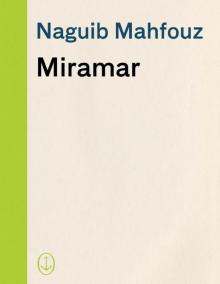 Miramar
Miramar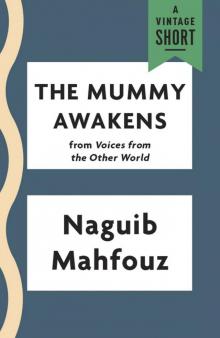 The Mummy Awakens
The Mummy Awakens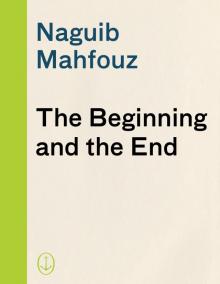 The Beginning and the End
The Beginning and the End Respected Sir, Wedding Song, the Search
Respected Sir, Wedding Song, the Search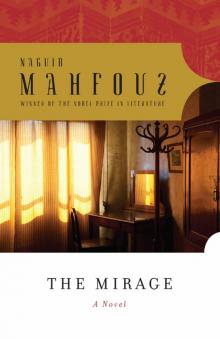 The Mirage
The Mirage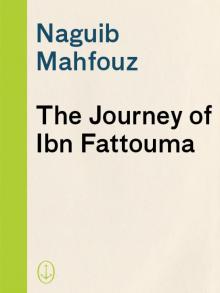 Novels by Naguib Mahfouz
Novels by Naguib Mahfouz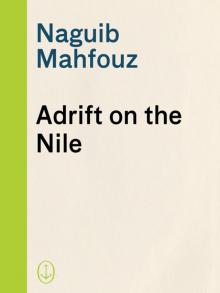 Adrift on the Nile
Adrift on the Nile Karnak Café
Karnak Café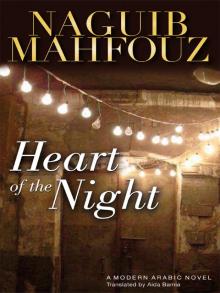 Heart of the Night
Heart of the Night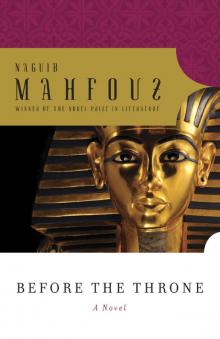 Before the Throne
Before the Throne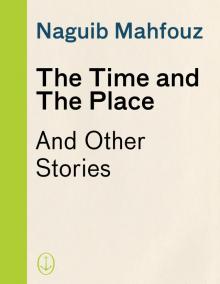 The Time and the Place: And Other Stories
The Time and the Place: And Other Stories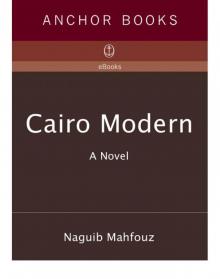 Cairo Modern
Cairo Modern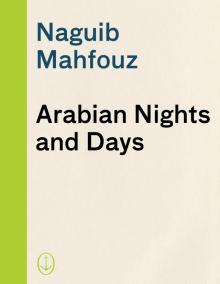 Arabian Nights and Days
Arabian Nights and Days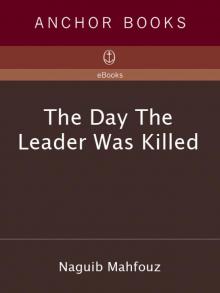 The Day the Leader Was Killed
The Day the Leader Was Killed Morning and Evening Talk
Morning and Evening Talk Three Novels of Ancient Egypt Khufu's Wisdom
Three Novels of Ancient Egypt Khufu's Wisdom Akhenaten: Dweller in Truth
Akhenaten: Dweller in Truth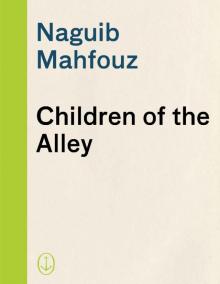 Children of the Alley
Children of the Alley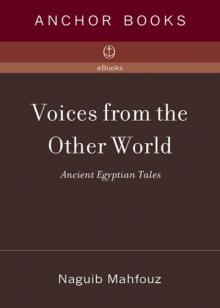 Voices From the Other World
Voices From the Other World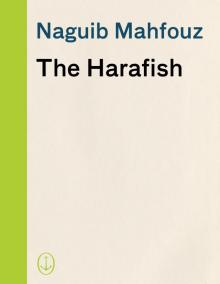 The Harafish
The Harafish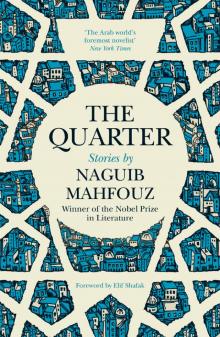 The Quarter
The Quarter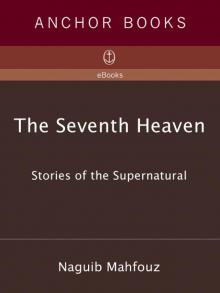 The Seventh Heaven: Supernatural Tales
The Seventh Heaven: Supernatural Tales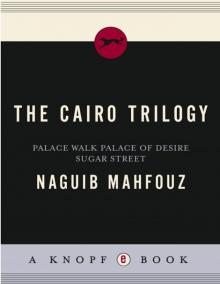 The Cairo Trilogy: Palace Walk, Palace of Desire, Sugar Street
The Cairo Trilogy: Palace Walk, Palace of Desire, Sugar Street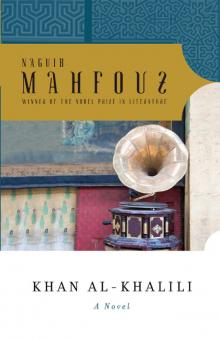 Khan Al-Khalili
Khan Al-Khalili Three Novels of Ancient Egypt Khufu's Wisdom, Rhadopis of Nubia, Thebes at War
Three Novels of Ancient Egypt Khufu's Wisdom, Rhadopis of Nubia, Thebes at War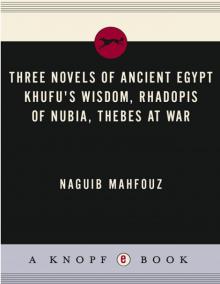 Three Novels of Ancient Egypt
Three Novels of Ancient Egypt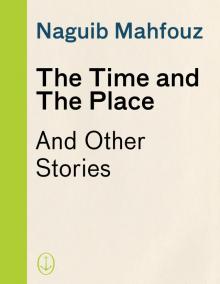 The Time and the Place
The Time and the Place Palace Walk tct-1
Palace Walk tct-1 Akhenaten
Akhenaten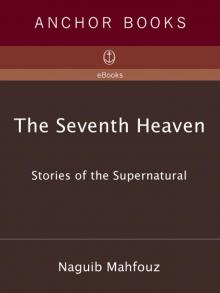 The Seventh Heaven
The Seventh Heaven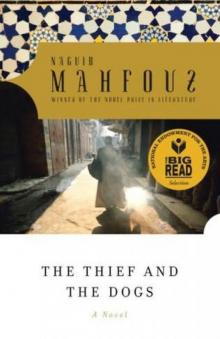 The Thief and the Dogs
The Thief and the Dogs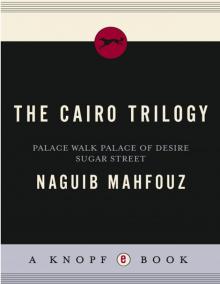 The Cairo Trilogy
The Cairo Trilogy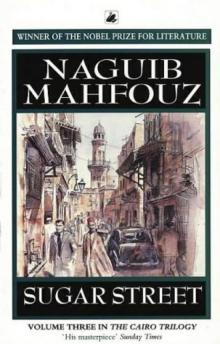 Sugar Street tct-3
Sugar Street tct-3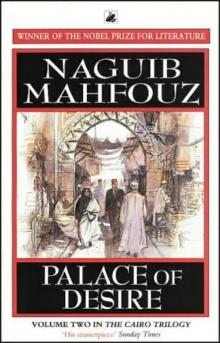 Palace of Desire tct-2
Palace of Desire tct-2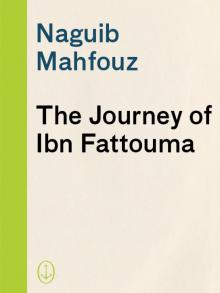 The Journey of Ibn Fattouma
The Journey of Ibn Fattouma